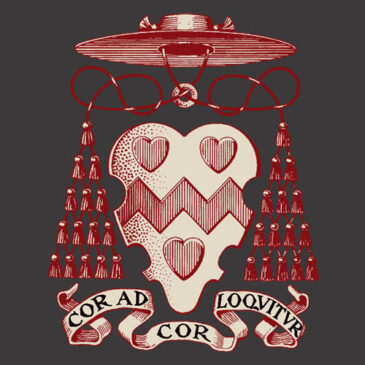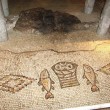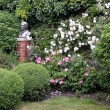On the Fitness of the Glories of Mary
 You may recollect, my brethren, our Lord’s words when on the day of His resurrection He had joined the two disciples on their way to Emmaus, and found them sad and perplexed in consequence of His death. He said, “Ought not Christ to suffer these things, and so enter into His glory?” He appealed to the fitness and congruity which existed between this otherwise surprising event and the other truths which had been revealed concerning the Divine purpose of saving the world. And so, too, St. Paul, in speaking of the same wonderful appointment of God; “It became Him,” he says, “for whom are all things, and through whom are all things, who had brought many sons unto glory
You may recollect, my brethren, our Lord’s words when on the day of His resurrection He had joined the two disciples on their way to Emmaus, and found them sad and perplexed in consequence of His death. He said, “Ought not Christ to suffer these things, and so enter into His glory?” He appealed to the fitness and congruity which existed between this otherwise surprising event and the other truths which had been revealed concerning the Divine purpose of saving the world. And so, too, St. Paul, in speaking of the same wonderful appointment of God; “It became Him,” he says, “for whom are all things, and through whom are all things, who had brought many sons unto glory


 I am going to ask you a question, my dear brethren, so trite, and therefore so uninteresting at first sight, that you may wonder why I put it, and may object that it will be difficult to fix the mind on it, and may anticipate that nothing profitable can be made of it. It is this:-“Why were you sent into the world?” Yet, after all, it is perhaps a thought more obvious than it is common, more easy than it is familiar; I mean it ought to come into your minds,
I am going to ask you a question, my dear brethren, so trite, and therefore so uninteresting at first sight, that you may wonder why I put it, and may object that it will be difficult to fix the mind on it, and may anticipate that nothing profitable can be made of it. It is this:-“Why were you sent into the world?” Yet, after all, it is perhaps a thought more obvious than it is common, more easy than it is familiar; I mean it ought to come into your minds,  He has sent forth for the ministry of reconciliation, not Angels, but men; He has sent forth your brethren to you, not beings of some unknown nature and some strange blood, but of your own bone and your own flesh, to preach to you. “Ye men of Galilee, why stand ye gazing up into heaven?” Here is the royal style and tone in which Angels speak to men, even though these men be Apostles;
He has sent forth for the ministry of reconciliation, not Angels, but men; He has sent forth your brethren to you, not beings of some unknown nature and some strange blood, but of your own bone and your own flesh, to preach to you. “Ye men of Galilee, why stand ye gazing up into heaven?” Here is the royal style and tone in which Angels speak to men, even though these men be Apostles;  PPS IV, 3; preached, March 20th, 1836
PPS IV, 3; preached, March 20th, 1836
 You know very well, my brethren, and there are few persons anywhere who deny it, that in the breast of every one there dwells a feeling or perception, which tells him the difference between right and wrong, and is the standard by which to measure thoughts and actions. It is called conscience; and even though it be not at all times powerful enough to rule us, still it is distinct and decisive enough to influence our views and form our judgments in the various matters which come before us.
You know very well, my brethren, and there are few persons anywhere who deny it, that in the breast of every one there dwells a feeling or perception, which tells him the difference between right and wrong, and is the standard by which to measure thoughts and actions. It is called conscience; and even though it be not at all times powerful enough to rule us, still it is distinct and decisive enough to influence our views and form our judgments in the various matters which come before us.

 While we look not at the things which are seen, but at the things which are not seen; for the things which are seen are temporal, but the things which are not seen are eternal.” 2 Cor. 4: 18.
While we look not at the things which are seen, but at the things which are not seen; for the things which are seen are temporal, but the things which are not seen are eternal.” 2 Cor. 4: 18. “Who can understand his errors? Cleanse Thou me from secret faults.” Psalm 19: 12.
“Who can understand his errors? Cleanse Thou me from secret faults.” Psalm 19: 12.